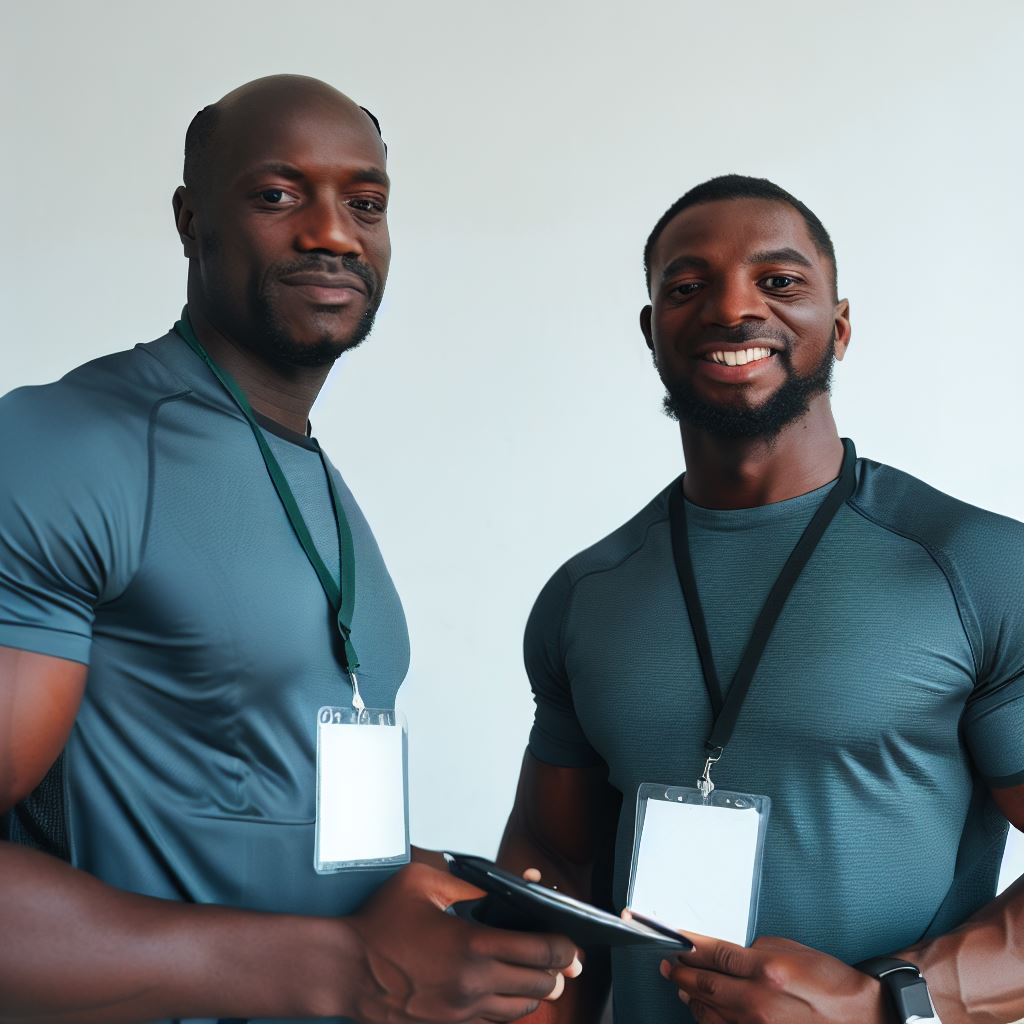Introduction
Assistant Athletic Trainer Career Overview: An assistant athletic trainer is a vital role in Nigeria’s sports industry, ensuring athletes’ well-being and performance.
Athletic trainers play a crucial role in sports, preventing and treating injuries, and enhancing athletes’ overall performance.
Assistant athletic trainers perform various duties, such as assisting head trainers, conducting assessments, and developing rehabilitation programs.
Explanation of the Importance of Athletic Trainers in Sports:
- Athletic trainers are the unsung heroes of sports, ensuring athletes’ well-being on and off the field.
- They prevent, assess, and treat injuries, safeguarding athletes’ performance and longevity.
- Athletic trainers aid in enhancing team performance by promoting athletes’ physical and mental health.
- They bridge the gap between medical care and sports, ensuring prompt treatment when injuries occur.
- Their expertise in injury prevention strategies reduces the risk of long-term health issues for athletes.
Overview of the Duties Performed by Assistant Athletic Trainers
- Injury Assessment: Assistant athletic trainers evaluate athletes’ injuries, determining their severity and appropriate treatment.
- Rehabilitation Programs: They design and oversee personalized rehab plans, aiding athletes’ recovery.
- First Aid: Immediate care for minor injuries, including wound dressing and taping, falls under their responsibilities.
- Taping and Bracing: Assistant athletic trainers apply taping and bracing techniques to prevent injuries and provide support.
- Education: They educate athletes on injury prevention, nutrition, and exercise techniques.
- Emergency Response: During critical situations, they coordinate emergency medical care and CPR.
- Record Keeping: Accurate documentation of injuries, treatments, and progress is essential.
- Collaboration: They work closely with coaches, physicians, and physical therapists to optimize athletes’ performance and recovery.
- Equipment Management: Maintaining and ensuring the safety of sports equipment is part of their job.
- Game-Day Support: Assistant athletic trainers are present during practices and games, ready to provide immediate care.
In this chapter, we’ve highlighted the indispensable role of assistant athletic trainers in Nigerian sports, emphasizing their contributions to athlete health and performance.
Stay tuned for more insights into this rewarding career.
Education and training required to become an assistant athletic trainer in Nigeria
Aspiring assistant athletic trainers in Nigeria need to fulfill certain education and training requirements. These include:
- Bachelor’s degree in athletic training or a related field: You need a bachelor’s degree in athletic training for an assistant athletic trainer role in Nigeria, offering fundamental principles and practices.
- Certification requirements: After earning a bachelor’s degree, individuals must certify as athletic trainers, meeting minimum competency standards set by organizations like NATA or BOC.
- Internship or practical experience: Assistant athletic trainers gain vital hands-on experience through internships or clinical rotations, applying knowledge under experienced guidance.
During their education and training, assistant athletic trainers in Nigeria acquire essential skills and knowledge.
They learn how to prevent, recognize, manage, and rehabilitate athletic injuries. They also gain expertise in emergency care, therapeutic exercise, and nutrition for athletes.
Apart from the education and training requirements, certain qualities are important for success in this career:
- Strong communication skills: Assistant athletic trainers must communicate clearly and concisely with athletes, coaches, and healthcare professionals to provide instructions and collaborate effectively.
- Excellent problem-solving abilities: Assistant trainers must assess injuries, make quick decisions, and provide athletes with appropriate care, showcasing critical thinking and problem-solving skills.
- Physical fitness and stamina: Assistant athletic trainers must maintain physical fitness to meet job demands, including aiding in on-field emergency care and conducting therapeutic exercises with athletes.
- Compassion and empathy: Assistant trainers must show compassion and empathy, offering emotional support to injured athletes throughout their recovery journey.
After completing education, training, and gaining experience, individuals can pursue assistant athletic trainer roles in sports organizations, universities, or professional teams.
The demand for qualified trainers is on the rise in Nigeria, as sports participation and awareness of athletic training continues to grow.
Read: Success Stories: Famous Nigerian Sports Information Directors
Job Opportunities for Assistant Athletic Trainers in Nigeria
Assistant athletic trainers play a crucial role in ensuring the health and well-being of athletes in Nigeria. With the country’s growing sports industry, there are ample job opportunities available for these professionals.
Availability of Positions in Various Sports Institutions and Organizations
- Universities and Colleges: Many higher education institutions in Nigeria have sports programs where assistant athletic trainers can find employment.
- Professional Sports Teams: Football, basketball, and other professional sports teams often hire assistant athletic trainers to support their athletes.
- National Sports Associations: These organizations, such as the Nigeria Football Federation, provide opportunities for assistant athletic trainers to work with national teams.
- Sports Medicine Clinics: Private clinics specializing in sports medicine require assistant athletic trainers to aid in athlete rehabilitation and injury prevention.
- Rehabilitation Centers: Assistant athletic trainers can find employment in various rehabilitation centers across the country, helping injured athletes recover.
- Fitness Centers: With the fitness industry on the rise, many fitness centers employ assistant athletic trainers to assist clients in their exercise routines.
Sports Teams and Clubs that Hire Assistant Athletic Trainers
- Nigeria Football Federation (NFF): A prominent organization that hires assistant athletic trainers for both the national team and youth divisions.
- Nigerian Professional Football League: Various football clubs in the country employ assistant athletic trainers to ensure the fitness of their players.
- Nigeria Basketball Federation (NBBF): Assistant athletic trainers can find opportunities working with the Nigerian national basketball teams.
- Nigeria Rugby Football Federation (NRFF): Rugby clubs and the national team often employ assistant athletic trainers to provide medical support.
- Nigeria Athletics Federation (AFN): Track and field clubs and the national team offer employment opportunities for assistant athletic trainers.
- Private Sports Academies: These training facilities hire assistant athletic trainers to coach and monitor young athletes.
Potential for Growth in the Field
The field of sports medicine and athletic training is evolving in Nigeria, creating room for growth and advancement.
- Specialization: Assistant athletic trainers can specialize in specific sports or areas of expertise, allowing them to become highly sought after in their field.
- Advanced Certifications: Pursuing advanced certifications, such as the Certified Strength and Conditioning Specialist (CSCS), can open up new opportunities.
- Research and Academia: Assistant athletic trainers can contribute to the field through research and teaching positions at universities and research institutions.
- International Opportunities: With Nigeria’s increasing prominence in international sports, assistant athletic trainers may find opportunities abroad.
Overall, the job prospects for assistant athletic trainers in Nigeria are promising. As sports continue to thrive in the country, the demand for qualified professionals in sports medicine will only grow.
Read: Job Opportunities in Sports Information Direction in Nigeria
Skills and Qualities Needed for a Successful Assistant Athletic Trainer Career
A career as an assistant athletic trainer in Nigeria requires a unique set of skills and qualities. It is a demanding field that demands a high level of knowledge, communication, teamwork, and physical fitness.
1. Knowledge of Sports Injuries and Treatment Techniques
- An assistant athletic trainer must have a comprehensive understanding of different sports injuries and the appropriate treatment techniques.
- They should be familiar with common injuries such as strains, sprains, fractures, and dislocations.
- Furthermore, they should stay updated with the latest research and advancements in the field of sports medicine.
2. Communication and Interpersonal Skills
- Effective communication is crucial for an assistant athletic trainer to interact with athletes, coaches, and other medical staff.
- They must be able to clearly explain diagnoses, treatment plans, and rehabilitation exercises to athletes and their families.
- They should also possess strong listening skills to understand athletes’ concerns and address them appropriately.
3. Ability to Work in a Team and Under Pressure
- An assistant athletic trainer must collaborate with a team of medical professionals, including physicians, physical therapists, and coaches.
- They should be able to work harmoniously with others and delegate responsibilities when required.
- Moreover, they must remain calm and composed in high-pressure situations, especially during sporting events or emergencies.
4. Physical Fitness and Stamina
- Being physically fit is essential for an assistant athletic trainer as they often need to physically assess and treat athletes.
- They should have the stamina to work long hours, travel with teams, and handle physically demanding tasks.
- Maintaining their own fitness also sets a positive example for athletes and reinforces the importance of a healthy lifestyle.
A successful assistant athletic trainer career in Nigeria requires a combination of knowledge, communication skills, teamwork abilities, and physical fitness.
By possessing these skills and qualities, individuals can make a positive impact on athletes’ performance, health, and overall well-being.
Read: Challenges Faced by Sports Information Directors in Nigeria

Challenges and Obstacles Faced by Assistant Athletic Trainers in Nigeria
Being an assistant athletic trainer in Nigeria comes with its fair share of challenges and obstacles. This article delves into some of the most prominent issues these professionals face daily.
1. Limited Resources and Funding for Sports Institutions
- Nigeria’s sports institutions often lack proper funding, resulting in limited resources for assistant athletic trainers.
- This shortage hampers the trainers’ ability to access modern equipment, cutting-edge technology, and adequate facilities necessary for athlete care.
- Without sufficient resources, assistant athletic trainers find themselves constrained and unable to provide the best possible care to athletes.
2. Lack of Awareness about the Importance of Athletic Trainers
- In Nigeria, there is a general lack of awareness regarding the vital role played by athletic trainers.
- Many people underestimate the significance of these professionals in the prevention, diagnosis, and rehabilitation of sports injuries.
- The lack of awareness often leads to a reduced demand for qualified trainers, affecting job opportunities and recognition in the field.
3. Balancing Multiple Responsibilities and Long Working Hours
- Assistant athletic trainers in Nigeria often find themselves juggling multiple responsibilities simultaneously.
- They have to handle the physical well-being of athletes, injury prevention, treatment, rehabilitation, and even administrative tasks.
- These professionals commonly work long and irregular hours, including evenings, weekends, and holidays, to meet the demands of their roles.
The challenges faced by assistant athletic trainers in Nigeria are significant and impact their ability to deliver optimal care to athletes.
It is crucial that these issues are addressed to enhance the overall quality of sports medicine in the country.
Read: Top Universities for Sports Information Studies in Nigeria
Salary and benefits for assistant athletic trainers in Nigeria
- The average salary range for assistant athletic trainers in Nigeria is between NGN 1,000,000 and NGN 4,000,000 per year.
- Assistant athletic trainers often receive benefits such as health insurance, paid leaves, and retirement plans.
- The field also offers perks like free gym memberships and discounts on sports apparel.
- Salary variations in this field can be influenced by several factors.
Average salary range
Assistant athletic trainers in Nigeria can expect an average salary in the range of NGN 1,000,000 and NGN 4,000,000 per year.
The actual salary depends on various factors such as experience, qualifications, and the employer.
Benefits and perks offered in the field
Assistant athletic trainers enjoy several benefits and perks in Nigeria. These include health insurance coverage, paid leaves, and retirement plans.
The field also offers perks like free gym memberships and discounts on sports apparel, which further enhance the overall compensation package.
Factors that may influence salary variations
Several factors can influence the salary variations for assistant athletic trainers in Nigeria. These include:
- Experience: Trainers with more years of experience tend to command higher salaries.
- Qualifications: Higher qualifications and certifications can lead to increased salary prospects.
- Location: Salaries may vary depending on the geographical location within Nigeria.
- Employer: Different employers may offer differing salary structures and benefits packages.
- Demand and competition: The demand for assistant athletic trainers and the level of competition in the market can affect salary negotiations.
- Specialization: Trainers with specialized skills or expertise in a specific area may earn higher salaries.
- Economic conditions: Economic factors such as inflation and market trends can impact salary levels.
Assistant athletic trainers in Nigeria receive competitive salary packages with a wide range of benefits and perks.
Salary variations are influenced by factors such as experience, qualifications, location, and employer. It is important for aspiring trainers to consider these factors when entering the field.
Conclusion
Assistant athletic trainers play a crucial role in Nigeria’s sports industry. They are responsible for ensuring the health and well-being of athletes, and are instrumental in preventing and managing injuries.
These trainers work closely with athletes, providing immediate care during practices and games.
They assess injuries, provide first aid, and rehabilitate athletes to get them back on the field as quickly and safely as possible.
The significance of assistant athletic trainers cannot be overstated. They contribute to the overall success of athletes and teams by ensuring their physical fitness and performance.
Their expertise helps prevent injuries and reduces the time athletes spend on the sidelines.
Aspiring athletic trainers should consider pursuing a career in this field. It offers immense opportunities to work with top-level athletes and contribute to their athletic development.
The role also provides a sense of fulfillment in helping athletes recover from injuries and achieve their peak performance.
However, assistant athletic trainers in Nigeria often remain underappreciated and unsupported. There is a need for increased recognition for their valuable contributions to sports.
Their role needs to be acknowledged and supported by sports organizations and governing bodies.
Assistant athletic trainers are essential in Nigeria’s sports industry. They play a vital role in ensuring the health and well-being of athletes, preventing injuries, and helping them recover.
Aspiring trainers should be encouraged to pursue a career in this field, and there should be increased support and recognition for their contributions.




